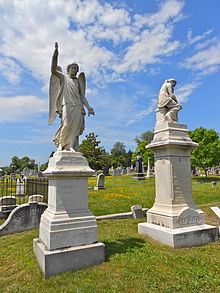Mary Ann Hall (1814 or 1815 – January 29, 1886)[1] ran a successful brothel from the 1840s until about 1878 at 349 Maryland Avenue S.W., Washington, D.C., about four blocks west of the United States Capitol.

Washington, D.C. brothel
editBefore the National Museum of the American Indian was built on the site in 1999, the Smithsonian Institution conducted an archeological excavation of the foundations and garbage dump of the house.[2]
The expensive tableware in the garbage dump was made of ironstone and porcelain. Food remnants include meat, fowl, fish, and exotic fruits, including coconuts and berries. French champagne corks were especially numerous. She built a three-story house on the site, which rose greatly in value. In 1864, the Union Army's Provost Marshal published a list of brothels in Washington, D.C., and Mary Ann Hall's had 18 "inmates," making it the largest in the city.[3]
Death
editShe died on January 29, 1886, with a net worth of $87,000, worth over $2,000,000 in 2005 dollars.[4] She was interred with her sister and other family members under "large and dignified" memorials at the Congressional Cemetery in Washington, D.C.[5]
Legacy
editHer summer home in Arlington County, Virginia, was later owned by Presley Marion Rixey and is now Marymount University.
References
edit- ^ "District of Columbia Deaths, 1874-1961". FamilySearch. Retrieved March 30, 2021.
- ^ Francis X. Clines, Archeology Find: Capital's Best Little Brothel, New York Times, April 18, 1999.
- ^ Mary Ann Hall's Brothel and Prostitution in Washington during the Civil War, 1997, accessed May 25, 2012.
- ^ Civil War Studies, Smithsonian Institution.
- ^ Smithsonian Institution, "Congressional Cemetery", accessed June 26, 2012.
Further reading
edit- Donna J. Seifert and Joseph Balicki, Mary Ann Hall's House, Historical Archeology, 2005, pp. 59–73.
- Madam on the Mall, Smithsonian Institution, accessed March 15, 2016.
- Archaeological Investigations National Museum of the American Indian Site Washington, D.C., 1997, accessed May 25, 2012.
External links
edit38°53′18″N 77°00′57″W / 38.8882°N 77.0158°W
- Congressional Cemetery, obituary and newspaper articles.
- Mary Ann Hall's Brothel